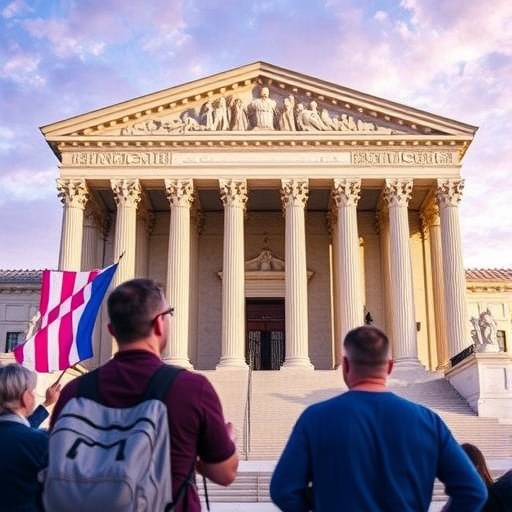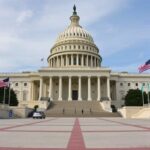In a move that could reshape policies across the nation, the Supreme Court has agreed to hear two high-stakes cases: one challenging Idaho’s strict ban on transgender students participating in school sports aligned with their gender identity, and another scrutinizing voting rights restrictions that threaten the integrity of local elections. These decisions, expected in the coming term, arrive amid escalating debates over Transgender Rights and Voting Rights, potentially setting precedents that echo far beyond state lines.
- Idaho’s Transgender Sports Ban Ignites National Firestorm
- Challengers Rally Behind Transgender Athletes’ Stories of Resilience
- Voting Rights Case Targets Local Election Safeguards in Swing States
- Interconnected Struggles: How Transgender and Voting Rights Converge in Court
- Ripples Ahead: National Precedents and Electoral Shifts on the Horizon
Idaho’s Transgender Sports Ban Ignites National Firestorm
The controversy in Idaho began in 2020 when state lawmakers passed the Fairness in Women’s Sports Act, prohibiting transgender girls and women from competing in female-designated athletic categories if they were assigned male at birth. This law, signed by Governor Brad Little, mandates that participation be determined solely by a student’s biological sex at birth, verified through birth certificates or genetic testing in some cases. Proponents argue it protects the fairness of women’s sports, citing concerns over physical advantages from male puberty.
However, the ban has faced immediate legal pushback. Lindsay Hecox, a transgender woman and triathlete from Boise, filed the initial lawsuit in 2020, claiming the law violates Title IX of the Education Amendments of 1972, which prohibits sex-based discrimination in federally funded education programs. Hecox, who transitioned after serving in the military, testified that the ban effectively bars her from local races, stating in court documents, “This isn’t about advantage; it’s about my right to live authentically and participate equally.”
The U.S. Court of Appeals for the Ninth Circuit partially upheld a lower court’s injunction against the ban in 2023, allowing transgender athletes to compete while the case wound through appeals. Now, with the Supreme Court set to intervene, the stakes are higher than ever. According to the Human Rights Campaign, at least 24 states have enacted similar restrictions since 2020, affecting an estimated 300,000 transgender youth nationwide. A 2022 UCLA study found that transgender students in states with such bans report 40% higher rates of anxiety and depression, underscoring the mental health toll.
Legal experts predict the Supreme Court will grapple with balancing Transgender Rights against competitive equity. “This case tests the boundaries of equal protection under the 14th Amendment,” said Lambda Legal attorney Chase Strangio, who is representing plaintiffs. “If Idaho’s ban stands, it could greenlight discrimination in every schoolyard in America.” On the opposing side, Alliance Defending Freedom attorney Kristen Waggoner argued in a recent brief, “Women’s sports have thrived under sex-segregated rules for decades; ignoring biology undermines that legacy.”
Challengers Rally Behind Transgender Athletes’ Stories of Resilience
Beyond the legal jargon, the Idaho case humanizes the broader fight for Transgender Rights. Take the story of Jordan Jackson, a 17-year-old transgender girl from Coeur d’Alene, Idaho, who was sidelined from her high school’s track team last year. Jackson, an aspiring Olympian with times competitive in the girls’ 400-meter dash, shared her heartbreak in a 2023 interview with NPR: “I’ve trained my whole life, but now I’m invisible because of who I am. Sports should build us up, not tear us down.” Her case, while not directly before the Court, exemplifies the real-world fallout of such policies.
Advocacy groups like the ACLU have amassed evidence showing minimal competitive impact from transgender participation. A 2021 analysis by the Canadian Centre for Ethics in Sport reviewed over 20 studies and concluded that hormone therapy significantly reduces any physiological advantages within one to two years, aligning transgender athletes’ performance with cisgender peers. In Idaho alone, only a handful of transgender students have sought to compete under inclusive policies before the ban, per state education records.
Yet, opponents highlight outliers like swimmer Lia Thomas, who won an NCAA title in 2022 after transitioning, fueling narratives of unfairness. Idaho Attorney General Raúl Labrador, in filings to the Supreme Court, emphasized, “Safeguarding opportunities for female athletes isn’t discrimination—it’s justice.” This rhetoric has galvanized conservative lawmakers, with 15 states filing amicus briefs in support of Idaho. Meanwhile, a coalition of 200 Olympic medalists, including Billie Jean King, urged the Court to strike down the ban, arguing in their brief that exclusion harms all athletes by fostering division.
The Supreme Court‘s docket timing is no coincidence; it follows a string of decisions on LGBTQ+ issues, from the 2020 Bostock ruling extending workplace protections to transgender employees. Justices’ past writings suggest a divided bench: Conservative justices like Clarence Thomas have expressed skepticism toward expansive Transgender Rights, while Sonia Sotomayor has championed inclusivity. Oral arguments are slated for late October, with a ruling anticipated by June 2024.
Voting Rights Case Targets Local Election Safeguards in Swing States
Shifting gears to democracy’s core, the Supreme Court will also examine a Voting Rights dispute originating in North Carolina, where a federal appeals court struck down parts of a 2022 state law imposing stricter voter ID requirements and limiting mail-in ballots for municipal elections. The case, Merrill v. Milligan II (a sequel to the 2023 gerrymandering ruling), questions whether these measures disproportionately burden minority voters in local races, potentially tipping scales in city councils and school boards.
North Carolina’s law, enacted amid post-2020 election fervor, requires photo ID for all in-person votes and restricts absentee ballot drop boxes to one per county—measures critics say echo Jim Crow-era suppression. The NAACP Legal Defense Fund, representing plaintiffs, argues the rules violate Section 2 of the Voting Rights Act of 1965, which bans practices that dilute minority voting power. Data from the Brennan Center for Justice reveals that in 2022, strict ID laws led to 1.2 million fewer ballots cast by Black and Latino voters nationwide, with turnout dropping 5% in affected areas.
The Fourth Circuit’s 2023 decision invalidated the provisions for local elections, finding they “severely and predictably” disadvantaged voters of color, who are less likely to have compliant IDs—only 66% of Black North Carolinians versus 82% of whites, per a 2021 state audit. Governor Roy Cooper, a Democrat, hailed the ruling: “Protecting Voting Rights isn’t partisan; it’s patriotic.” But Republican legislators appealed, contending the law enhances election security against fraud claims amplified since 2020.
Amicus briefs flood in: The U.S. Conference of Mayors warns that curbed local voting could exacerbate urban-rural divides, while the Heritage Foundation cites isolated fraud incidents to defend the restrictions. “Fraud may be rare, but even one instance erodes trust,” said election law professor Rick Hasen of UC Irvine. With midterms looming, this case intersects with ongoing battles in Georgia and Texas, where similar laws have slashed early voting sites by 20-30%, according to the Voting Rights Lab.
Interconnected Struggles: How Transgender and Voting Rights Converge in Court
Though distinct, these cases illuminate overlapping tensions in American jurisprudence. Both pit state-level innovations against federal protections, testing the Supreme Court‘s role in a polarized era. For Transgender Rights, the Idaho ban reflects a wave of 500+ anti-LGBTQ+ bills introduced in 2023 alone, per the ACLU—many targeting youth in schools and sports. Similarly, Voting Rights challenges have surged post-Shelby County v. Holder (2013), which gutted federal preclearance, leading to a 300% increase in restrictive laws, reports the Leadership Conference on Civil and Human Rights.
Transgender voters, who lean Democratic by 70% according to a 2022 GLAAD poll, face compounded barriers. In states like Idaho and North Carolina, where both issues brew, advocates note that youth disenfranchisement in schools mirrors voter suppression. “These aren’t isolated fights; they’re assaults on marginalized voices,” said Andrea James, executive director of the Transgender Law Center. Statistics bear this out: Transgender individuals are 2.5 times more likely to be turned away at polls due to ID mismatches, per a 2021 National Center for Transgender Equality survey.
The Supreme Court‘s conservative majority—bolstered by three Trump appointees—has shown willingness to curb federal oversight, as in the 2023 affirmative action ruling. Yet, Chief Justice John Roberts has occasionally sided with broader rights, dissenting in Shelby. Legal scholars like Erwin Chemerinsky of UC Berkeley predict narrow rulings: “The Court might uphold core bans but carve exceptions, leaving chaos for lower courts.”
Ripples Ahead: National Precedents and Electoral Shifts on the Horizon
If the Supreme Court upholds Idaho’s ban, it could validate 20+ state laws, forcing thousands of transgender students into seclusion or litigation. Schools might overhaul policies, with Title IX compliance hanging in the balance—potentially costing districts millions in federal aid. Conversely, striking it down would affirm Transgender Rights as civil rights, emboldening challenges to bathroom bills and healthcare restrictions. The NCAA, which paused Idaho events in 2020, awaits clarity to resume inclusive tournaments.
On Voting Rights, a win for North Carolina challengers could invalidate ID mandates in 10 states, boosting turnout by 2-3 million votes, estimates the Sentencing Project. Local elections, often deciding education and housing policies, would see more diverse representation—crucial in cities where people of color comprise 40% of the population but only 25% of officials, per a 2023 Urban Institute report. But affirming the law might entrench GOP advantages in redistricting, influencing 2024 congressional races.
As arguments unfold, civil rights groups mobilize: Planned Parenthood and the League of Women Voters plan amicus coalitions, while conservative PACs fund ad blitzes. President Biden, addressing the Supreme Court in his 2023 State of the Union, vowed to “restore the soul of our nation” through voting protections, hinting at legislative responses like the John Lewis Voting Rights Advancement Act, stalled in Congress. For transgender advocates, House Democrats push the Equality Act, though passage remains elusive.
Ultimately, these cases underscore a judiciary at a crossroads. With public approval of the Supreme Court dipping to 40% in 2023 Gallup polls, rulings here could either heal divides or deepen them. As one plaintiff put it, “This is about belonging—for athletes on the field and voters at the ballot box.” The nation’s gaze turns to Washington, where justice’s scales may tip toward inclusion or exclusion, forever altering the landscape of rights.








